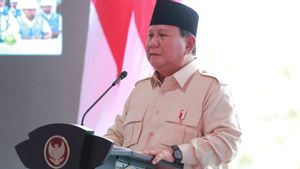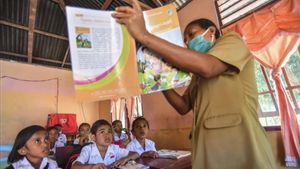JAKARTA - National Education Day (Hardiknas) is a warning that the government should not ignore education in the midst of the current coronavirus or COVID-19 pandemic. Ignoring it is a fatal omission that can invite disaster. It takes systematic steps in the education sector in the face of a pandemic.
Coordinator of the Indonesian Education Monitoring Network (JPPI) Ubaid Matraji said education services in Indonesia are still stuttering in the face of disasters. This can be seen from the fulfillment of the right to education for citizens which has not become a priority in an emergency situation.
Ubaid gave an example, from the emergency fund for the response to COVID-19 amounting to Rp. 405 trillion, in fact it did not touch the education sector at all.
"In fact, education funds at the Ministry of Education and Culture and the Ministry of Religion were circumcised and reallocated for other sectors," said Ubaid to reporters. "As a result, the threats in the education sector are increasingly real," he added.
Even though there are many threats lurking in the world of education during a pandemic. For example, the threat of dropping out of school. Ubaid said the pandemic will have an impact on the ability of parents to send their children to school. Because many of our schools still collect fees.
Not to mention, the question of the threat of schools to go out of business. This is because not a few private schools in Indonesia have closed. They are the components most affected by the pandemic. The 2020 Ministry of Education and Culture's survey noted that almost 56 percent of private schools in Indonesia are choked by operational costs.
In addition, the problem of mass depression also threatens many schools. Starting from students, parents, teachers, parents, school principals and others.
The problem is we are still using the normal education curriculum. As a result, the children are burdened with many tasks every day, the teachers have difficulty delivering the material, not to mention the parents who have to accompany their children every day.
"If this situation is allowed a mass depression will occur and the body will be more susceptible to the virus," said Ubaid.
This shows that educational learning in Indonesia is still very conventional and has not been able to take advantage of technology and local resources as a learning process.
Emergency curriculum
To solve this problem, Ubaid is pushing for emergency curriculum reformulation. The government must make special guidelines and curricula during a pandemic. This is important so that learning does not create stress and achieves measurable targets. For example, in a normal school situation there is a daily target, during an emergency, the target can be set weekly or even monthly.
To support the emergency curriculum, of course there needs to be an increase in teacher competence. "This is a momentum to upgrade the competence of teachers to be able to carry out learning processes in a flexible, creative and innovative way," explained Ubaid.
Of course to carry out this "additional task" the education budget must be increased, not the other way around. Because education funds are also distributed to beneficiaries affected by COVID-19. Sadly, there are still a lot of BOS funds that have not been disbursed due to bureaucratic stagnation.
Then last but not least is to uphold the principle of education for all. Education services must be able to reach all groups and be inclusive, especially for groups that have been left behind such as women, groups with disabilities, and children in 3T areas (disadvantaged, frontier and outermost).
The English, Chinese, Japanese, Arabic, and French versions are automatically generated by the AI. So there may still be inaccuracies in translating, please always see Indonesian as our main language. (system supported by DigitalSiber.id)













